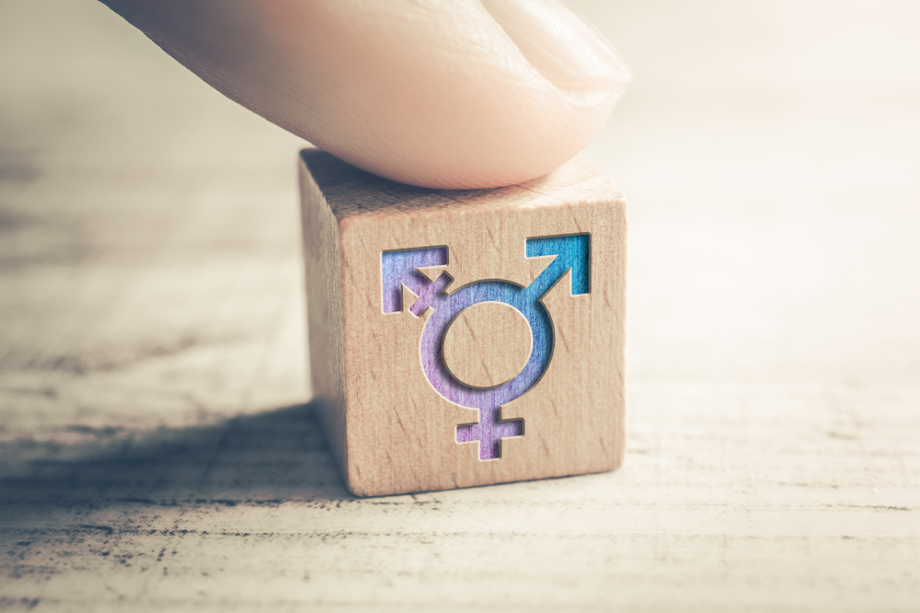July 5th, 2023, is my one year T-versary - or anniversary since starting on testosterone hormone therapy! One full year of weekly injections, hormonal changes that are essentially a second puberty, and, most important, one year of progress toward a body that aligns with my gender identity – transmasc non-binary.
Not every transmasc and/or non-binary person takes hormones as part of their transition. Some can’t access hormones even if they want them, and others don’t want to take hormones at all. When I first came out, I didn’t think I’d take hormones either. My transition goals were focused on gender expression – dressing more masculine, getting a “men’s cut” instead of the pixie cuts I’d always gotten while clinging to femininity, and changing my pronouns to they/them. Testosterone seemed like a drastic step to me, and I was fairly sure that facial hair, more body hair and bottom growth would make me more dysphoric than I already was. Because I’m not a woman, but I’m not a man either.
The decision to go on testosterone was actually kind of fate. I have endometriosis, and the symptoms are often treated with birth control pills. When my gynecologist discovered the disease had spread, I was presented with two options – surgery or birth control. I’d just come out as non-binary, and the thought of putting female hormones into my body literally made me sick. I did a bunch of research and discovered that some trans men with endometriosis found that testosterone reduced their symptoms.
So, I talked to my partner, at length, about starting T. My partner is a cis man, and until I came out as non-binary, he’d always considered himself straight. I was terrified that he’d be freaked out about me presenting more masculine and going on T. Luckily, I have an amazing partner. He only had two questions: did I want a mustache and beard and would it change the way we had sex?
I told him that I definitely didn’t want a mustache or beard, and explained that I also wanted to start a medication called Finasteride, commonly called "Fin." Finasteride is a commonly prescribed medication for male pattern baldness, but some non-binary folks use it along with T to limit bottom growth (the enlargement of the clitoris that happens on T, commonly called a T-dick) and facial and body hair growth. I stressed that it was impossible to know how T would change my body and that taking Fin might not prevent the changes I didn’t want. He said if I didn’t care he didn’t care.
A bit wary, I asked how he’d feel if I got a T-dick. He just shrugged and asked if we could still have penis in vagina sex. It had never occurred to me that we wouldn’t still have PIV sex. I’ve always loved PIV sex, and neither my vagina nor PIV sex had ever given me dysphoria. I didn’t think that would change on T, and that’s what I told him. He told me to go for it.
So, I talked to my gynecologist. Although she was a bit shocked because I came out and told her I wanted to medically transition in the same appointment, which was supposed to be about my endometriosis recurrence, she thanked me for trusting her with my transition and said we could start T and Fin right away.
More than a year later, a lot has changed, including my sex life. But it hasn’t changed in any of the ways I thought it might.
To be honest, the changes in my sex life really surprised me, and it made me think a lot about how sex has changed for other people on T. So, I started doing some research and talking to other non-binary and trans folks who take T. Here’s what I found out.
Read: 7 Best Sex Toys for FTM Transgender People with Bottom Growth
Sex After Testosterone: Results *Will* Vary
The biggest thing I’ve taken away from all my research and conversations is that gender-affirming hormone therapy impacts people in highly individual and wildly varied ways. There’s no “normal” or “abnormal” when it comes to the changes that happen in your body, mind and sex life. My experiences are way different from those of the people I talked to and the participants in the studies I read. Sure, there are some common experiences, but even those common experiences don’t happen for everyone.
There’s no “normal” or “abnormal” when it comes to the changes that happen in your body, mind and sex life.
You’re Probably Gonna Get *Really* Horny
When I started researching the changes that happen on T, increased sex drive was the one that came up the most. In one study, 89% of participants reported an increased libido after starting T.
My libido has always been high. When I’ve had partners with higher libidos, sex multiple times a week was the norm.
Before I started T, I was kind of worried about being even hornier all the time, and to be honest, the worry was warranted. Within a few weeks of starting T I was horny to the point of distraction, pretty much all the time. My vibrator became my best friend because my partner absolutely could not keep up, and I can’t blame him. I wanted sex all the time - no one could have kept up with me!
Other people I talked to had similar experiences. One said that they wanted to have sex three or four times a day.
“Puberty was ON!" another person I talked to told me. "My dick/clit was growing and my libido skyrocketed… I would get aroused very easily. I masturbated a lot in the first few years. At around that three- to five-year mark was when my libido was more like it was pre-T.”
Our experiences track with the research as well. One person told researchers that they felt like their sex drive didn’t have “an off button” and another said they were “jerking off multiple times a day.”
This increase in sex drive happens partially because higher testosterone levels often create a higher sex drive, but that wasn’t the only reason people mentioned. The people I talked to said that one of the drivers of their increased libidos was feeling more comfortable in their bodies and with their partners. This sentiment was shared by research participants.
One of the drivers of their increased libidos was feeling more comfortable in their bodies and with their partners.
But, like any side effect of taking T, a sky-high libido isn’t a guarantee. Some people find that their sex drive doesn’t go up at all, and that’s perfectly normal too!
The Sexual Activities You Like Might Change
I really didn’t expect T to change how I had sex, but it has. I’ve always been comfortable with PIV sex; thankfully, that hasn’t changed at all since I started T. But there’s still a lot that’s different about the way my partner and I have sex now.
I like much more aggressive sex than I used to, and though I was fairly adventurous before T, I’m willing to try a lot more than I was before. Like, we’ve started using sex toys together. Before T, my trusty vibrator was for solo sex only. Now, we incorporate the vibe into our sex sessions all the time.
For some people, T completely changes the sexual activities they’re willing to try or engage in regularly. “[Before T] I enjoyed being fisted and anal, occasionally. [After T] anal was the shit!” one person I spoke to told me.
Our experiences are shared by many people on T, as revealed by one study that examined how trans men’s sexual habits changed throughout their transitions. Many of the participants in the study discovered that they were willing to try sexual activities that they didn’t engage in before starting T or that sexual activities that previously weren’t enjoyable were much more enjoyable on T.
A common experience among participants in the studies I read was feeling more comfortable engaging in different sexual activities as their bodies changed and their mental health improved throughout their transitions. For many, certain sexual activities or any sexual activity at all triggered dysphoria pre-T. After T, they felt like their bodies aligned with their gender and that partners or potential partners finally saw them as their true gender, which made them more comfortable with different sexual activities.
Your Orgasms Might Change
It’s always been really easy for me to orgasm, during pretty much any kind of sexual activity, and I’ve always had really amazing orgasms. I really didn’t think that my orgasms could get any better, but since I’ve been on T, the orgasms have been totally mind-blowing. My partner pokes fun at me all the time because pretty much every time we have sex I’m like, “That was the best orgasm I’ve ever had!” I swear I’m not exaggerating!
My orgasms feel way more intense now, and the sensation is more centered on my clitoris than they were before. Edging is a whole new part of my sex life, which I’d never experienced pre-T. Sometimes I can edge for several minutes before cumming, and it’s the most intense pleasure I’ve ever felt during sex.
The kind of stimulation I need to orgasm has changed as well. I used to be able to orgasm from vaginal penetration alone, but now I absolutely need clitoral stimulation. I also like clitoral stimulation a lot more than I did before. I can feel my clit get hard, even though I haven’t had much bottom growth at all.
The people I talked to also experienced big changes in their orgasms. They said that their orgasms were centered on their T-dicks, and they were able to ejaculate during orgasm.
One said, “My chest became very sensitive once going on T and at a certain point, I needed nipple stimulation to achieve orgasm, which hadn't been the case prior to T.”
Though everyone I spoke to and many of the participants in the studies I read said that their orgasms changed, some mentioned that they didn’t change for the better.
Another person I spoke to said, “Pre-T it was really easy to cum. [T] made it harder to cum. [Orgasms] seem, like, shallower/quicker.”
Trouble orgasming after starting T isn’t uncommon, but try not to get too discouraged! Sometimes it just takes time and experimentation to figure out what works for your changing body.
Your Sexual Attraction Might Change
Believe it or not, a lot of people find their sexuality shifting after they start T. Some people who were sure they were only attracted to women find that they’re suddenly interested in cis men after starting T. A lot of research has been done on this phenomenon, and both researchers and participants have proposed a few reasons why this might happen.
One is the massive increase in libido that often comes with starting T. People whose sex drives increase dramatically may want to try new things, including sex with people whose gender identity and bodies are different from what they’ve been attracted to in the past.
Different sources of sexual attention may also play a role. When trans men and transmasc folks start presenting as more masculine, they may receive attention from gay cis men or cis women when they didn’t before, and this interest may spark a shift in attraction.
One of the people I spoke to explained, “After a few months on T most people started reading me as male fairly consistently. When that happened, I noticed that my attraction to cisgender men increased. The attraction and desire had always been there, but their ability to see me as masc or as male was nonexistent. Once I was seen, truly seen, I started pursuing more cis male partners. Simultaneously, I was experiencing a type of queer erasure when I was with women. The more I was seen as male, the more our coupling was perceived as straight. I think this dynamic - my need to be recognized as queer and as male - motivated me to seek out cis or trans male partners.”
Similarly, trans men and transmasc people often feel less dysphoria around sex in general after starting T, which can shift the sexual encounters they seek out.
This one hasn’t been as dramatic for me, at least yet. I’ve always been sexually attracted to both men and women, and my husband is a cis man. I will say that I used to be way more sexually attracted to female bodies than male bodies before starting T, and now it’s starting to even out.
If you’re experiencing difficulties with sex after starting T, try talking to a therapist or a sex therapist to get some advice. Going on T is a huge change; even if it’s for the best, there are always bumps along the road. Lots of us transmasc folks and trans men are having amazing sex on T. Even if it takes some time to get there, chances are you will too!




